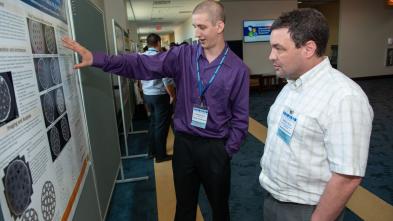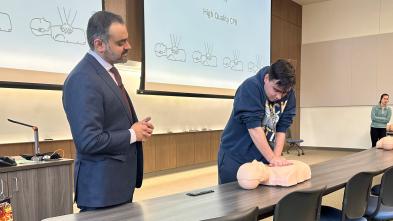The Rural Health Innovation Alliance was announced May 23 at the Wisconsin Technology Council luncheon held at UW-Eau Claire.
UW-Eau Claire Chancellor James Schmidt said the focus of the Rural Health Innovation Alliance is to create a “sandbox” model that spurs innovation through collaborations among multiple health care providers and others in an open environment where data, technology and successes are shared.
“In many ways, this is a logical next step of the work on our workforce development grant,” Schmidt says, referencing the $9.4 million Workforce Innovation Grant UW-Eau Claire received in 2021 from the Wisconsin Economic Development Corp. UW-Eau Claire was awarded the grant to focus on strengthening the workforce to improve health and well-being in rural areas across northwest Wisconsin. The work also builds on UW-Eau Claire’s long history of collaboration with regional health care providers. These trusted relationships form the foundation of this expanded work and aspirational vision.
The Rural Health Innovation Alliance aspires to make the Chippewa Valley region the epicenter for testing innovative care models and global technology solutions for rural health care delivery, which, if successful, could become a national model.
Schmidt says the project is a long-term initiative to create innovative delivery models for accessing health care. He noted that the initiators support the work of those seeking solutions to recent hospital closures and do not wish to duplicate or impede their efforts. The initiative is focused on building a collaborative environment to test new ideas and solutions to improve access to health care, while considering the social determinants of health that are unique to rural settings. Making quality health care available and advancing health equity in rural communities has long been a challenge.
Discovering new approaches and products to improve access to care for patients in rural areas is a critical goal of the RHIA. Research, discovery, testing and product improvements will occur within the innovation sandbox mentioned in the proposal. Testing, analyzing data and sharing expertise to continually refine delivery models and products will be common practice.
A related consequence to this project is the potential to spur economic development in the Chippewa Valley. Schmidt says the RHIA wants to positively impact workforce development, while attracting and retaining entrepreneurs focusing on the information technology community, artificial intelligence solutions, software testing, clinical trials and medical device manufacturers, to name a few. Entrepreneurs who want to create businesses to support this innovation will want to either start new companies or relocate their businesses here to be close to the epicenter.
Schmidt says a critical part of UW-Eau Claire’s mission is to educate and train the health care workforce of the future. With thousands of students interested in health care-related careers, UW-Eau Claire students will have a unique hands-on opportunity to learn and test these emerging solutions to improve the quality of life in the Chippewa Valley and beyond.
One of the initial steps outlined by the alliance’s plan includes the creation of “microsites” within several communities. The purpose of the microsites is to enhance access to health care for patients in rural areas, and the services available at these sites could include urgent care, behavioral health, primary care, maternal care, pediatrics and oncology. The small, versatile microsites would feature both in-person and virtual care. The hybrid approach will utilize cutting-edge technology and delivery models focused on establishing new paradigms for future health care.
Ultimately, the alliance hopes those solutions can be scaled across the country and perhaps around the world.



